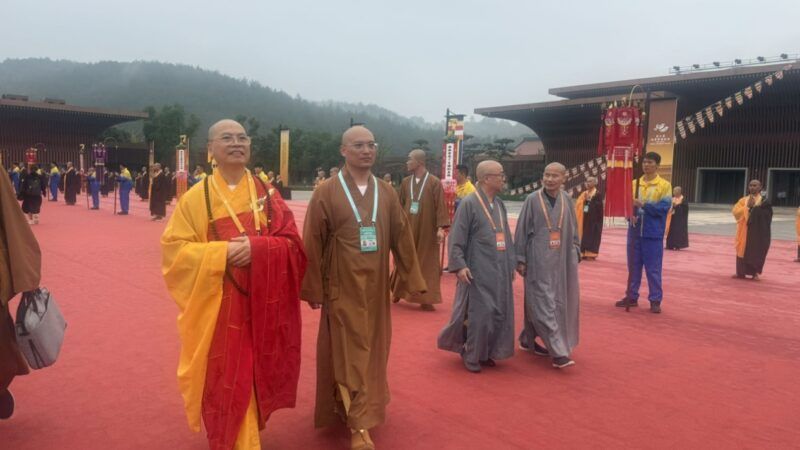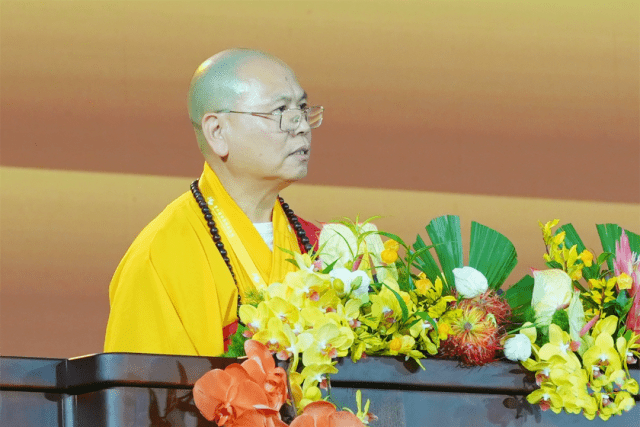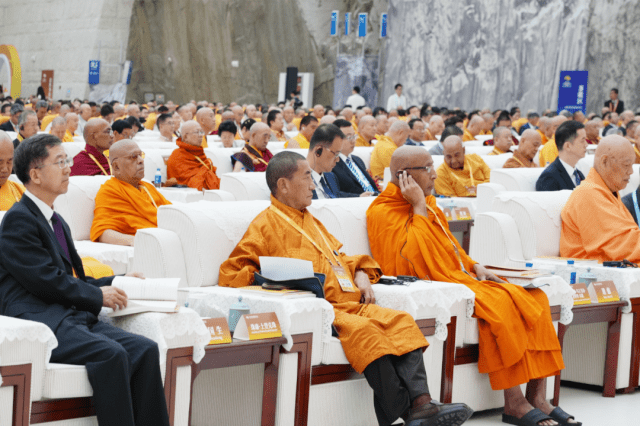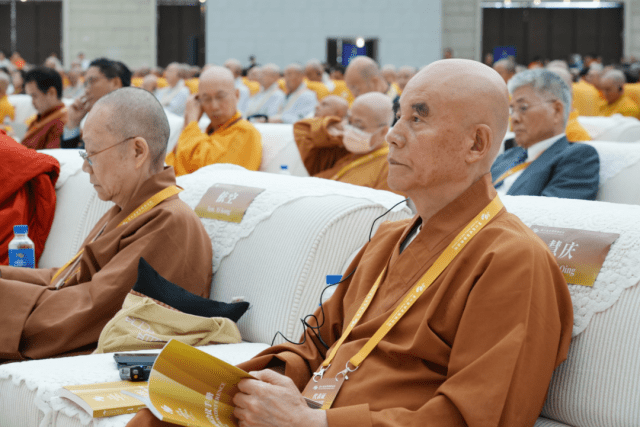On October 15, 2024, the 6th World Buddhist Forum grandly opened in Ningbo, Zhejiang, China.
Buddhists, experts, scholars, and distinguished guests from 72 countries and regions around the world attended the forum.
On the morning of October 16, the President of the Buddhist Association of Canada, the Abbot of the Five Great Mountains Monastery in Canada, and the Abbot of the Chan Shan Temple in Canada delivered a keynote speech at the main forum. The full text is as follows:
The long-awaited 6th World Buddhist Forum, an event of great significance to Buddhists around the world, has successfully opened at the renowned Maitreya Temple – Xuedou Mountain in Fenghua, Ningbo.
On behalf of the Buddhist Association of Canada, I extend my warm congratulations to the forum, and express my heartfelt gratitude to the Chinese Buddhist Association and all those working behind the scenes for their efforts in making this forum a success!

Key Quotes from the Keynote Speech:
The World Buddhist Forum has become a banner for uniting and connecting Buddhists around the world.
The Buddhist Association of Canada has always “shared aspirations” with the World Buddhist Forum. Eighteen years ago, at the First World Buddhist Forum, I announced to the world that the Four Great Buddhist Mountains of Canada would be built in North America, with the first phase being the Wutai Shan Buddhist Garden. This April, Canada’s Wutai Shan Buddhist Garden was officially opened to the public.

Looking back at the history of Buddhist philanthropic activities which reveals two historical dimensions: First, Buddhism has a long-standing and well-functioning tradition of philanthropy; second, Buddhist philanthropy has never been merely about making donations or almsgiving. Instead, it is based on the genuine intention of a sincere desire to help society and assist people in overcoming difficulties, practice various skillful means for the benefit of all beings. This reflects a holistic concept of charity.

Looking at the revitalization of Chinese Mahayana Buddhism in modern times, Chinese Buddhism is fundamentally rooted in “compassion,” guided by “precepts,” and engaged in worldly affairs with a transcendent mindset. Buddhist philanthropy has thus returned to the main path of helping the world and saving the people to relieve suffering and benefit others.
Compassion is the purpose of Buddhism, public welfare and charity are the duties of Buddhists.
Without sentient beings, no bodhisattva can attain supreme enlightenment. Buddhist philanthropy and charitable endeavors are precisely ways to benefit all sentient beings with great compassion.

Giving is the foremost of the “Six Perfections”, and is the essential path from ordinary people to saints and to the other shore of Nirvana. It is the most basic practice method for becoming a Buddha.
Charitable giving is not just a one-way act of helping others, but also an act of self-help. Through the practice of giving, the recipient is relieved of difficulties, while the giver receives real benefits – a clean mind, a manifestation of wisdom, and the promise of future blessings. Thus, it is a mutually beneficial process for both the giver and the receiver.

The most important contents in Buddhist thought are compassion and wisdom. Wisdom focuses on seeking transcendence, aiming for teachings that lead one out of the world; while compassion emphasizes on helping others, concentrating on teachings that pertain to the world.
Mahayana Buddhism encompasses both transcendence from, and engagement with, the world; and charity is an effective way to practice this approach.
Buddha established the teachings to save sentient beings from the suffering of birth, aging, sickness, and death through the dual practice of transcending the world and engaging with it … Buddhist philanthropy endeavors to educate and nurture, aiming for the beneficiaries to deeply understand the Buddha’s compassion, salvation, and the principles of equality and non-duality.

Those who have taken the Bodhisattva precepts should actively engage in activities that benefit the public, rather than practicing behind closed doors. As a disciple of the Buddha and a member of the society, one should fulfill one’s obligation to the country, seek happiness for the community, and strive to improve the lives of the people.
In the twists and turns of the history of chariy and public welfare, Mahayana Buddhism has completed a positive turn in six aspects of the Buddhist philanthropy. These six aspects, from theoretical construction to action guidelines, constitute the basic framework of modern Mahayana Buddhism’s philanthropy.

The Buddhist Association of Canada not only inherits the glorious tradition of Mahayana Buddhism, which emphasizes on compassion and benefiting the sentient beings, but also actively adjusts and explores in line with the localization reality of North America.
The Buddhist Association of Canada draws inspiration from the early Mahayana Buddhist concept of “Buddha’s Path” by regularly sending translations of Buddhist scriptures to prisons and correctional institutions in North America. This initiative aims to educate inmates through the teachings of Buddhism, guiding them to listen to the Dharma and make positive changes in their lives. Every year, letters pour in from prisons across North America requesting multilingual Buddhist texts.

The philanthropic activities of the Buddhist Association of Canada have inherited the Mahayana Buddhism’s ideals of helping others and selfless compassion. These efforts carry forward the positive traditions of modern engaged Buddhism, emphasizing compassion and active involvement in the world. Practically, they integrate the philanthropic traditions of North American society and the realities of a multicultural environment, promoting the localization of Buddhist philanthropic initiatives with an international perspective.
Although the philanthropic endeavors of Mahayana Buddhism have experienced fluctuations and setbacks during certain historical periods, the virtuous monks and insightful individuals within the Buddhist community have responded to the trends of the times and worked to steer Mahayana Buddhism back onto the right path. This reflects Buddhism’s strong capacity for self-correction and demonstrates the powerful vitality of the Dharma’s dissemination.
Public welfare and charity are not societal burdens imposed on Buddhism by the outside world, but are intrinsic attributes and rational choices of Buddhism.

The essence of Buddhism is the pursuit of enlightenment, which requires practitioners to “awaken to wisdom, refrain from evil and follow good” in their practice. This fundamental nature establishes charity as an intrinsic attribute of Buddhism.
As Buddhists, one should regard engaging in charity as an important way to practice the Dharma and a significant aspect of life. Through charitable activities, practitioners can enhance their awakening, improve their morality, and ultimately achieve their ideal values in life.
Philanthropy is the main channel for Buddhism to propagate its teachings and benefit sentient beings. Relieving suffering and bringing happiness, as well as benefiting sentient beings are the only methods for Buddhists to help the world and save people.

The history of the propagation of Buddha Dharma has always been closely linked to the social philanthropic activities, which are inherent in Buddhism.
The Buddhist concepts of “unconditional great compassion” and “compassion for all beings” lay the foundation for the expansive charitable spirit of Buddhism. The principles of “equality among all beings” and “selflessness for the benefit of others” drive Buddhist philanthropic activities into society and touch people’s hearts. Building on this, the commitment to “harmonizing compassion and wisdom,” and adhering to an “integrated view of charity” or “localized practice,” allows for skillful means to alleviate suffering and promote the Dharma for the benefit of all. This is the endless practical experience of Mahayana Buddhism.

Compassion for all and active engagement in the world are the inner motivations behind Buddhist philanthropic endeavors. Kindness can bring happiness, and compassion can relieve suffering. Practitioners of Mahayana Buddhism should consistently uphold the spirit of the Buddha’s compassion to save the world, prioritizing the relief of suffering and the promotion of happiness through philanthropic activities.
Mahayana Buddhists should aspire to benefit others, follow the Bodhisattva precepts, and practice the “Six Perfections” and the “Four means of Embracing” to fulfill their roles and responsibilities as disciples of the Buddha, and to uphold the virtues of the sacred teachings.
The Buddhist Association of Canada inherits the philanthropic tradition of Chinese Mahayana Buddhism and embraces the compassionate spirit of modern humanistic Buddhism. With a transcendent mindset, it actively participates in the worldly affairs, exploring and practicing in accordance with the realities of North American society. This has led to the formation of a new distinctive framework of Buddhist philanthropy with its own characteristics, and becoming a unique model for an international outreach of modern Buddhism.
Finally, I wish this forum great success and extend my best wishes for good health, happiness, and prosperity to all attendees!
Source: Shi Dayi, President of the Buddhist Association of Canada

